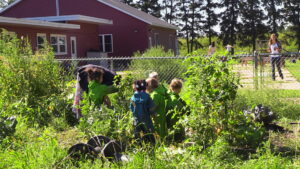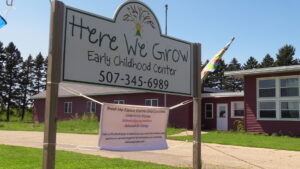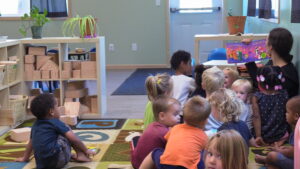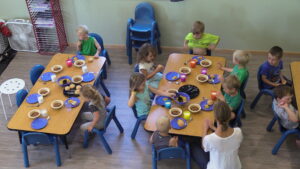By Marie Huey, Public Policy & Advocacy CoordinatorVideo by Kristie Thorson, Communications SpecialistEarly Education Spotlight is an ongoing series that showcases great work happening in high-quality child care and preschool settings across Minnesota. From innovative early learning programs to parent perspectives on what works, check out the Early Education Spotlight for unique examples of Minnesota’s early learning successes.
Bugs are a perennial favorite for kids at Here We Grow. There are plenty of grasshoppers to chase in the garden. Water exploration is also a highlight, and several pumps are stationed around the outdoor play area.The nature-based early childhood center, located in Mankato, contains many opportunities for children to learn and grow outside. Owner and Director Elizabeth Bangert wrote the curriculum and designed the space for this Four Star Parent Aware rated program.The Reggio-inspired curriculum means children direct the learning. Rather than set unit topics and lengths, Here We Grow has provocations based on children’s interests. This year a one week provocation about the human body turned into seven weeks. One of the children’s parents, a physician, came in to talk about wound care. The kids explored functions of white and red blood cells, with help from their teachers, of course.Because children spend most of their time outside, they have plenty of opportunity to interact with other children and talk. Parents are amazed at how quickly their child’s vocabulary expands at Here We Grow. The outdoors is also a perfect setting to develop gross motor skills. Running, jumping, climbing, digging, and splashing are just a few of the activities encouraged by the play area.When weather is not suitable for outdoor play, children have options in the indoor space. Stormy days are great for reading or playing in one of the lofts.When it comes to adjusting activities for the different ages, the main difference is self-help levels. The younger children need assistance with dressing, eating, and potty training. The older ones are more independent. Here We Grow’s staff guide them intentionally. All of the staff are full time and have early childhood education experience or are working toward a child care credential.Here We Grow’s owner is responsible for more than just what goes on in the classroom. Bangert is the business manager, Human Resources department, lawn mower, painter, and construction worker. Growing up with parents who owned a business, Bangert learned the financial basics early on. She started the center in 2013 after months of working on renovations in the evening after her daytime nanny job. She has gradually added new equipment and features. The main area of the center was renovated recently to include classrooms with high ceilings and child-friendly bathrooms.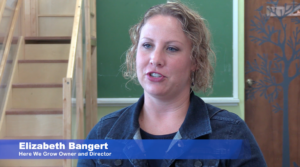 Bangert also advocates for better child care policies. Very aware of the importance of quality child care, she laments that staff turnover in the field is 30%. With average hourly wages at $9.77, about 46% of child care workers live in poverty.High-quality care caries significant costs, but families can only pay so much. Bangert said, “There’s a very personal and emotional side to running a business like this that I think people don’t realize.”“You know families and you know sometimes they can’t pay their bills and you want to help them do that, but you also have to pay your own bills.”Bangert testified at several hearings during the legislative session and takes advantage of other opportunities as well. She also encourages parents to advocate for better child care policies and provides them with resources to start.Amidst the struggles and frustrations of running a center, Bangert strives to provide unique, high-quality experiences for families. Here We Grow partners with community organizations and works to connect parents. Local restaurant Friesens provides farm-to-table meals for the children. They partner with a chiropractor who specializes in services for children. Last year the center offered an optional family directory. Families provided their information so they could arrange play dates, and they could also share their work information to encourage parents to do business with each other. Bangert doesn’t like the “drop and go” model of child care, so she tries to facilitate interactions between other parents and with staff.
Bangert also advocates for better child care policies. Very aware of the importance of quality child care, she laments that staff turnover in the field is 30%. With average hourly wages at $9.77, about 46% of child care workers live in poverty.High-quality care caries significant costs, but families can only pay so much. Bangert said, “There’s a very personal and emotional side to running a business like this that I think people don’t realize.”“You know families and you know sometimes they can’t pay their bills and you want to help them do that, but you also have to pay your own bills.”Bangert testified at several hearings during the legislative session and takes advantage of other opportunities as well. She also encourages parents to advocate for better child care policies and provides them with resources to start.Amidst the struggles and frustrations of running a center, Bangert strives to provide unique, high-quality experiences for families. Here We Grow partners with community organizations and works to connect parents. Local restaurant Friesens provides farm-to-table meals for the children. They partner with a chiropractor who specializes in services for children. Last year the center offered an optional family directory. Families provided their information so they could arrange play dates, and they could also share their work information to encourage parents to do business with each other. Bangert doesn’t like the “drop and go” model of child care, so she tries to facilitate interactions between other parents and with staff.

